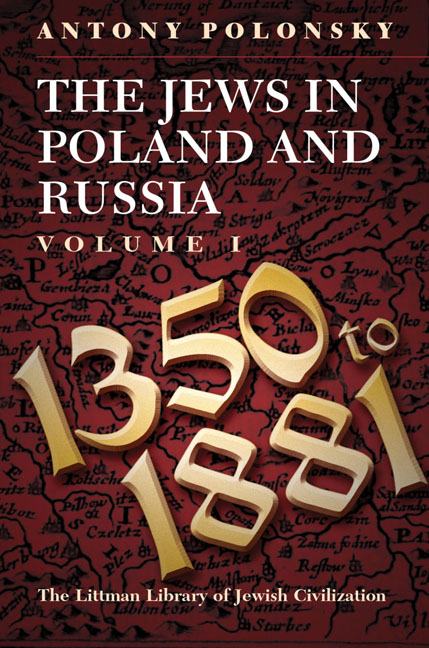Book contents
- Frontmatter
- Dedication
- Acknowledgements
- Contents
- List of Maps
- List of Tables
- Note on Transliteration
- Note on Place Names
- Maps
- General Introduction
- PART I JEWISH LIFE IN POLAND–LITHUANIA TO 1750
- PART II ATTEMPTS TO TRANSFORM AND INTEGRATE THE JEWS, AND THE JEWISH RESPONSE, 1750–1880
- Glossary
- Bibliography
- Index
2 - The Structure of Jewish Autonomous Institutions
- Frontmatter
- Dedication
- Acknowledgements
- Contents
- List of Maps
- List of Tables
- Note on Transliteration
- Note on Place Names
- Maps
- General Introduction
- PART I JEWISH LIFE IN POLAND–LITHUANIA TO 1750
- PART II ATTEMPTS TO TRANSFORM AND INTEGRATE THE JEWS, AND THE JEWISH RESPONSE, 1750–1880
- Glossary
- Bibliography
- Index
Summary
‘The sceptre shall not depart from Judah’—these are the Exilarchs in Babylonia … ‘nor the ruler's staff from between his feet’—these are the descendants of Hillel who teach Torah to the people.
BT SAN. 5a, commenting on GEN. 49: 10[The Council of Four Lands] is a fragment of redemption and a scrap of honour, proving that Almighty God in his great pity and lovingkindness had not deserted us.
The Memoirs of Ber of Bolechow (1723–1805)IN THE PREVIOUS CHAPTER it was pointed out that there were two contrasting aspects of the position of the Jews in early modern Poland–Lithuania. On the one hand, they were a pariah group, tolerated in an inferior position, a status highlighted by the constant references to them in legal documents from the sixteenth century as ‘unbelieving’ (infidus, perfidus, or incredulus) and by the contempt in which they were held by most Christians. On the other, they were in many respects a corporation with the legal right to govern themselves as did all medieval corporations, whether those of an estate, like the nobility, or of a specific group, like the burghers of a particular town. In this context it should be stressed that freedom in the Middle Ages had a ‘local rather than a universal character’. The words ‘liberty’ and ‘freedom’ generally appeared in the plural form, as in the ‘rights and liberties’ of town, province, or estate which were granted by the sovereign and carefully recorded in charters. The rights and obligations of an individual were derived from participation in a given community: the abstract idea of individual ‘human rights’ was alien to medieval thinking.
The Jews were in the same position as other groups in society, possessing rights which were guaranteed to them by charters, whether general or applying to a specific region or town or to the institutions through which Jewish communal autonomy was exercised. The character of Jewish communal autonomy has given rise to a considerable literature. Jews have everywhere sought such autonomy since they established themselves in the diaspora.
- Type
- Chapter
- Information
- The Jews in Poland and RussiaVolume I: 1350 to 1881, pp. 40 - 67Publisher: Liverpool University PressPrint publication year: 2009

